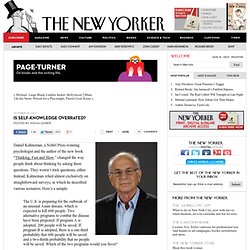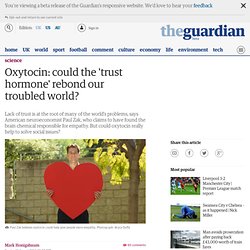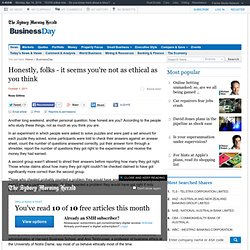

Jonah Lehrer on Yogurt, Gut Feelings and the Mind Body Problem. Don’t Blink! The Hazards of Confidence. The Book Bench: Is Self-Knowledge Overrated? When Kahneman put this question to a few hundred physicians, seventy-two per cent chose option A, the safe-and-sure strategy.

Most doctors would rather save a certain number of people for sure than risk the possibility that everyone might die. The U.S. is preparing for the outbreak of an unusual Asian disease, which is expected to kill 600 people. Two alternative programs to combat the disease have been proposed. If program C is adopted, 400 people will die. If program D is adopted, there is a one-third probability that nobody will die and a two-thirds probability that 600 people will die.
The two different hypotheticals, of course, examine identical dilemmas: saving one-third of the population is the same as losing two-thirds. Why are doctors so inconsistent? It’s impossible to overstate the influence of Kahneman and Tversky. Consider the story of Harry Markowitz, a Nobel Prize-winning economist who largely invented the field of investment-portfolio theory.
Willpower - By Roy F. Baumeister and John Tierney - Book Review. M.guardian.co.uk. Listening to Paul Zak extol the virtues of oxytocin, the "love hormone", is like hearing a preacher sing the praises of the Promised Land.

His idea of a harmonious oxytocin-fuelled society is so seductive you find yourself almost praying it were true. At the same time, you cannot help but wonder if it might be an illusion. Oxytocin is best known for its use in inducing labour. However, according to Zak, the director of the Centre for Neuroeconomics at Claremont Graduate University, California, it is also the "social glue" that binds families, communities, and societies, and fosters trust between strangers. To illustrate his point, at a recent appearance at TED Edinburgh, Zak spritzed the backstage staff with oxytocin, prompting a spontaneous outbreak of group hugging.
When we finally speak, Zak tells me that "oxytocin is primarily a molecule of social connection. "It's the ultimate moral molecule," says Zak, who describes himself as a "born-again Smithian". It's a tempting offer. Honestly, folks - it seems you're not as ethical as you think. Another long weekend, another personal question: how honest are you?

According to the people who study these things, not as much as you think you are. In an experiment in which people were asked to solve puzzles and were paid a set amount for each puzzle they solved, some participants were told to check their answers against an answer sheet, count the number of questions answered correctly, put their answer form through a shredder, report the number of questions they got right to the experimenter and receive the money they had earned. A second group wasn't allowed to shred their answers before reporting how many they got right. Those whose claims about how many they got right couldn't be checked claimed to have got significantly more correct than the second group.
Those who cheated probably counted a problem they would have answered correctly if only they hadn't made a careless mistake. Advertisement Clearly, that's not possible. Some people are consciously, deliberately unethical.